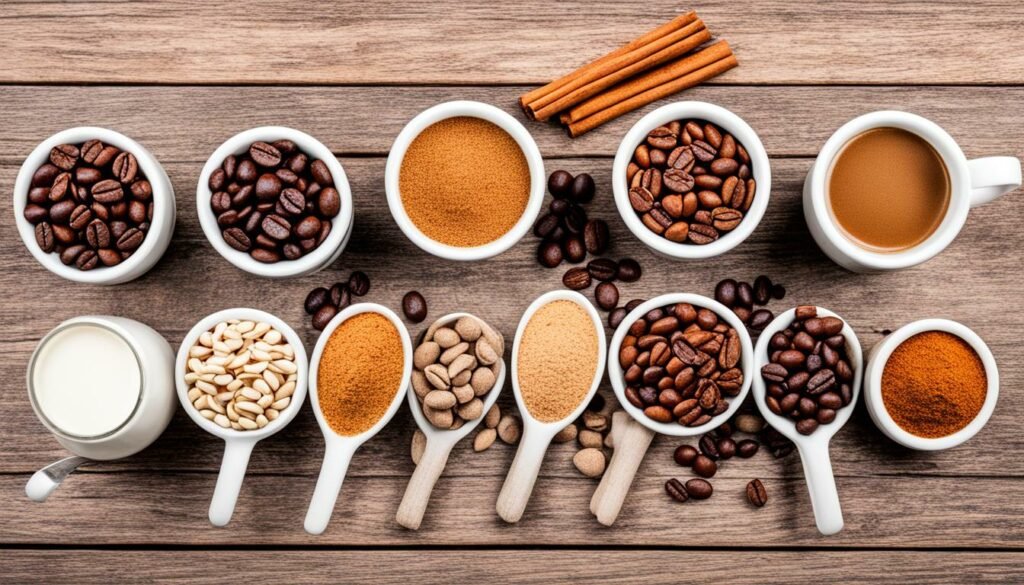Have you ever thought your daily coffee could be making you gain weight? Roughly 65% of American adults drink coffee daily, says the National Coffee Association. Coffee’s rich flavor and energy-boosting effects are well-loved. But, does your morning cup add extra pounds?
The simple answer is, not quite. Dietitian Megan Rasmussen highlights that coffee itself is mostly calorie-free. Yet, if you add creams, syrups, and sweeteners, you’re significantly upping the calories. A large Mocha Cookie Crumble Frappuccino from Starbucks packs 480 calories and 55 grams of sugar. This exceeds the daily sugar limit recommended by the American Heart Association. So, is your favorite coffee drink causing more harm than good?
Looking at the impact of coffee on metabolism, things get interesting. Caffeine can speed up metabolism and help burn fat during exercise. But, too much caffeine, especially late in the day, can mess up your sleep. This can lead to hormonal problems and possibly weight gain.
So, it’s vital to look deeper into how our coffee drinking affects our weight. We need to understand how everyday coffee choices might be affecting our diets. Let’s explore the connection between coffee and calorie intake. This way, we can see if our coffee habits are helping or hurting our efforts to stay fit.
Coffee and Calorie Content: The Basics
It’s important to think about coffee’s calories for our health. Black coffee is great for weight management because it has very few calories, especially when not adding anything to it.
Calories in Black Coffee
Black coffee is known for having very few calories. It only has 2 calories per cup, says the USDA. Thanks to its ingredients like chlorogenic acid and trigonelline, black coffee can help with reducing blood sugar spikes and maybe lower weight.
Impact of Additives on Caloric Intake
Adding things to your black coffee changes the calorie story. Sugar, syrup, and cream make this low-calorie drink into a not so low-calorie treat. Katherine Zeratsky, R.D., L.D., warns that these add-ons can make your coffee high in calories, working against burning fat.
Here’s a quick look at how many calories some common coffee adds give:
| Item | Calories per Serving |
|---|---|
| 1 tsp Sugar | 16 |
| 1 tbsp Cream | 52 |
| 1 tbsp Syrup | 50 |
Knowing about these extras helps. It lets us keep enjoying black coffee without the high calories from toppings.
The Role of Caffeine in Weight Management
Caffeine plays a big part in weight management. It boosts metabolism and affects how we experience hunger. This means it can help control weight in two ways. We’ll explore how caffeine hooks up with metabolism. We’ll also see if coffee really helps lower appetite.
Caffeine and Metabolism Boost
Caffeine is cheers for speeding up metabolism. When we link caffeine with metabolism, we see it makes our bodies burn more fuel. One study showed that more than three milligrams of caffeine per kilogram of your weight could up how much fat we burn during activities. This is great news for anyone not very active but wanting to exercise more.
Caffeine and Appetite Suppression
Coffee can help reduce hunger by lowering ghrelin, the hunger hormone. This can cut down on the calories you eat, which is good for those who find it hard to curb their hunger. Plus, after enjoying a cup, some people feel full longer. This makes sticking to a healthy diet easier, without feeling like you’re missing out.
Does Coffee Make You Gain Weight?
The effect of coffee on weight gain depends on what kind you drink. Black coffee with no sugar has very few calories. This can actually help with weight management. But, coffee drinks loaded with calories are a risk. Let’s dive into this topic more.
High-Calorie Coffee Drinks and Weight Gain
Coffee drinks in popular cafes often pack a lot of sugar and additives. This boosts their calorie count. For instance, a Starbucks Grande Caramel Frappuccino has 420 calories. That’s as much as some desserts.
Drinking these high-calorie coffee blends everyday can pile on the pounds. Toppings like whipped cream and flavored syrups make them even more calorific. So yes, these drinks can lead to weight gain.
Impact of Sugar and Creamers
Adding sugar and creamer to coffee makes it taste better. But these raise the drink’s calorie count a lot. Non-dairy creamers and syrups, along with whole milk, are full of sugars and fats.
A scoop of regular coffee creamer can add 35 calories. And most people use more than one scoop. Over time, this extra intake can really affect your weight. So, the effect of creamers shouldn’t be ignored when trying to stay healthy.
| Beverage | Calories | Sugar (g) |
|---|---|---|
| Black Coffee | 2 | 0 |
| Starbucks Grande Caramel Frappuccino | 420 | 66 |
| Coffee with 1 Tbsp Creamer | 37 | 5 |
Timing of Coffee Consumption and Sleep
It’s important to understand how coffee and sleep connect. Late-day caffeine can harm your sleep. It may stop you from falling asleep easily or staying asleep.
Effect on Sleep Quality
The link between coffee and your sleep is well known. Caffeine is a stimulant that blocks sleep-promoting adenosine. This makes it hard to wind down at night. A Risk Management and Healthcare Policy study found caffeine affects sleep for up to six hours. So, it disrupts your natural sleep cycle.
Sleep Deprivation and Weight Gain
Sleep deprivation and weight gain go hand in hand. Not getting enough sleep affects hormones that help control hunger. When you drink coffee too late, it may boost a hormone named ghrelin. This could make you eat more and gain weight. Bad sleep also causes more inflammation and leads to holding onto extra salt. This makes managing weight even harder.
Coffee and Hormonal Imbalance
Understanding the link between coffee and hormonal imbalance is key to good health. Coffee can boost cortisol, our stress hormone. When we drink coffee in the morning, this effect is even stronger.
Studies, like one in Stress and Health, show high cortisol raises cravings for sugary and fatty foods. This can lead to more cortisol and weight gain.
Research in Physiology & Behavior shows a clear link between high stress, high cortisol, and eating more. Being careful about your coffee habits can help you manage stress better and control your weight.
Taking your body’s natural schedule into account is important when it comes to coffee. By doing this, you can enjoy the positive effects of coffee while avoiding its stress and weight-related issues.
Healthier Coffee Choices for Weight Management
Choosing the right ingredients and watching portion sizes are key for healthier coffee options. Aim for the best additives and use them moderately to cut down on unwanted calories.
Choosing Low-Calorie Additives
Using low-calorie additives for coffee can cut down on calories. Pick low-fat or plant-based milk over full-cream options. Almond or oat milk offer a creamy taste with fewer calories. Try honey or stevia for sweetness without too many extra calories.

Spices and Natural Sweeteners
Spices like cinnamon, nutmeg, and vanilla change your coffee game. They add flavor with no extra calories. Make your coffee tastier and keep your eye on those decaf coffee weight gain rumors by using these smart additives.
Importance of Moderation
Don’t forget about moderation, even with healthy options. Enjoying a latte or a frappuccino now and then is okay. But, don’t let them become your daily drink. Dietitian Megan Rasmussen suggests making these treats for special times. This helps keep your calorie count in check, supporting your efforts to manage weight.
Conclusion
Coffee itself does not directly cause weight gain. The real issue lies in what we add to it and when we drink it. Adding high-calorie sugars and creams leads to more calories.
To avoid putting on weight, choose coffee wisely. Go for plain coffee or add low-calorie options like sweeteners and creams. Plus, you can use spices to make it tastier without the extra calories.
It’s all about managing your coffee intake smartly. Choose low-calorie options and watch when you drink it. This way, you can keep enjoying coffee while keeping your weight in check. If you’re smart about it, coffee can fit into a healthy lifestyle well.
FAQ
Does coffee make you gain weight?
Coffee by itself doesn’t make you gain weight. But, mixing it with creams, syrups, and sweeteners adds extra calories. This can lead to weight gain. To avoid this, stick to plain black coffee.
How many calories are in black coffee?
A cup of black coffee has only 2 calories, as per the USDA. This makes it a good choice if you’re watching your calories.
How do additives impact the caloric content of coffee?
Sugar, syrups, and cream raise coffee’s calories a lot. Take the Starbucks Mocha Cookie Crumble Frappuccino, for example. It has 480 calories and 55 grams of sugar.
Does caffeine boost metabolism?
Yes, caffeine can speed up your metabolism, which helps with managing weight. Also, it can lower the hunger hormone ghrelin. This might help reduce your calorie intake.
How does coffee suppress appetite?
Caffeine can make you feel less hungry by reducing ghrelin. It might also boost how many calories your body burns. This could help with keeping your weight in check.
Can high-calorie coffee drinks contribute to weight gain?
Drinks like the Starbucks Grande Caramel Frappuccino, with 420 calories, can indeed add to weight gain. They are high in calories.
What is the impact of sugar and creamers on weight?
Sugar and creamers can turn coffee from low-calorie to high-calorie. For example, heavy cream and flavored syrups add a lot of calories. This can lead to weight gain.
How does the timing of coffee consumption affect sleep?
Drinking coffee near bedtime can affect the quality of your sleep. It’s because caffeine is a stimulant. Poor sleep can make you hungry and lead to more calorie intake and salt retention.
Can sleep deprivation lead to weight gain?
Yes, not getting enough sleep because of caffeine can raise your ghrelin and cortisol levels. This can make you more hungry, crave foods, and gain weight.
How does coffee consumption impact hormonal balance?
Coffee can increase the stress hormone cortisol, especially in the morning. High cortisol often leads to wanting high-sugar and high-fat foods. This can lead to weight gain.
What are healthier coffee choices for weight management?
Healthy options include low-fat or plant-based milk and natural sweeteners like honey in small amounts. Enjoy specialty drinks sometimes to manage your calorie intake.
How can I choose low-calorie additives for my coffee?
Choose low-fat milk alternatives and natural sweeteners to keep your coffee calories in check. Stay away from high-calorie creamers and syrups.
Are spices and natural sweeteners good options?
Yes, spices like cinnamon and nutmeg, as well as small amounts of honey, are good choices. They add flavor without loading up your coffee with calories.
Why is moderation important in coffee consumption?
Being moderate prevents a calorie buildup from sweeteners and creams. It also helps avoid sleep disruption. Enjoying specialty coffee drinks on occasion can help manage your calorie intake.












